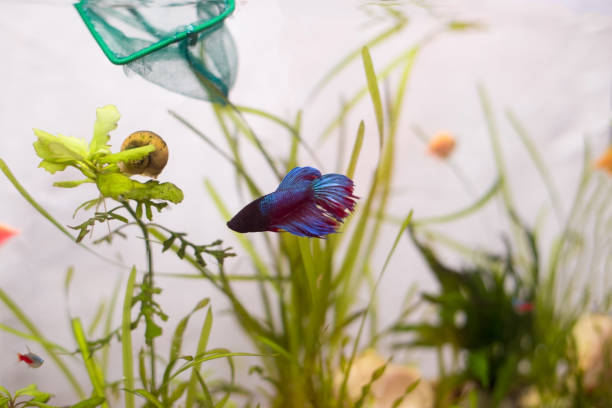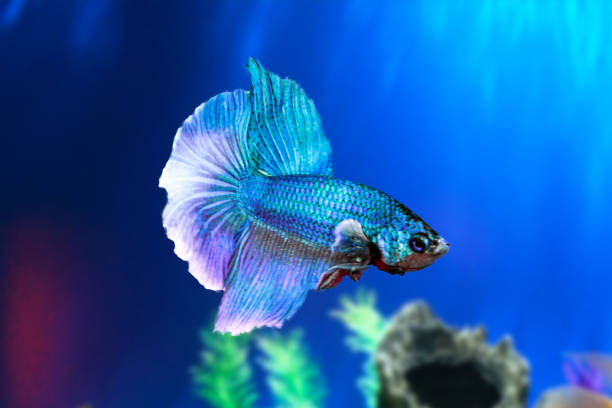Does Betta Fish Need Filter: Benefits & Recommendations
Betta fish are a popular freshwater aquarium fish. They are known for their brightly colored fins and are often sold in small, brightly lit tanks. The question about betta fish needing an aquarium filter or not has been a discussion for a long time. That’s a question many people have, and the answer is not always straightforward.
In general, betta fish don’t need a betta filter to survive, but they will benefit a lot from having one and it may also extend their lifespan in captivity. In this post, we’ll take a look at the needs of betta fish and whether a filter is necessary for their tank.

Table of Contents
What Are the Benefits of Filter to Betta Fish?
A filter is a device that removes impurities and debris from the water. This can be important for fish, as water with too much debris can contain bacteria and other toxins that can harm them. Some filters also add minerals and vitamins to the water, which can benefit fish.
A Betta fish will appreciate a filter to live a healthy life. Without a filter, the water will be full of bacteria and other pollutants that can harm your pet. Here are some of the significance of having a filter inside your aquarium:
- A filter will help to remove large particles, dirt, debris, and other harmful substances from the water.
- Filters can also help to improve the color and clarity of a fish’s water.
- Filters can also help to reduce the amount of ammonia and nitrite in a fish’s water.
- Filters can also help to improve the water’s quality by removing harmful chemicals and pollutants.
- Filters can be used to help keep fish from getting sick.
- Filters provide a safe and comfortable home for your betta fish.
- Filters provide a place for your betta fish to breed.
What Happens In an Aquarium Without Filter?
Betta fish are popular aquarium fish. They are small, colorful fish that can be found in many different habitats. Some people keep betta fish in tanks without filters, while others keep them in tanks with filters. There is no right or wrong answer, as each person’s setup will be different. It is important to research which type of filter is best for your betta fish and to purchase the appropriate filter for the size of your tank.
However, if your betta fish tank does not have any filters, there is a bigger possibility that the water will become cloudy and dirty very quickly. The fish will also start to suffer from poor health, as they will be unable to swim in the dirty water. You should get a filter for your tank if you do not want to see these negative effects happen.
What Happens If Filter Is Unstable?
Betta fish need a filter to help with water quality and to remove waste. If the filter is too strong, it can harm your betta fish. If the filter is not strong enough, your betta fish may not be able to breathe and may die. It is important to find a filter that is suitable for your betta fish’s size and water quality.
What Are The Different Filtration Methods?

Mechanical Filtration
Mechanical filtration is the process of trapping and removing particles from a fluid using a filter. The filter can be anything from a sponge to a metal screen. The most common type of mechanical filtration is using a water filter. Betta fish are small tropical fish that can get use of a mechanical filter to keep them healthy. This is because their small internal organs do not produce enough waste to handle on their own. A mechanical filter removes debris and pollutants from the water, keeping your betta healthy and happy.
Chemical Filtration
Chemical filtration is the process used to remove unwanted chemicals and biological debris from the water. This can be done by using chemical or filter media in conjunction with beneficial bacteria, but other mechanical mediums may also be utilized for these processes. The most common type of chemical filtration is activated carbon filtration, which uses a material called activated carbon to absorb toxins and chemicals.
Biological Filtration
Biological filtration is the use of bacteria to remove unwanted waste in the water. Many people choose to add beneficial bacteria and nitrifying organisms into their aquariums, which can help with water quality and carbonate build-up. Bacteria can utilize nitrogenous compounds as energy sources, breaking down toxic materials that compete against healthy ones for nutrition within your tank so they do not have room to flourish or reproduce.
What Are the Different Types of Filters for Bettas?
Power Filter
A power filter works by trapping particles and debris as they are drawn through the filter. The larger particles are caught first, and then the finer particles are caught. This type of filter is typically used in aquariums with fish that require a high level of cleanliness, such as betta fish.
Internal Filter
Internal filters work by trapping and removing debris and particles from the water as it passes through the filter. They are typically made of a material such as sponge, foam, or cloth that can trap and remove large pieces of debris as well as smaller particles. This can help to improve the quality of the water and keep your betta fish healthy.
Undergravel Filter
Another type of filtration that can be used in aquariums with betta fish is an undergravel filter. Undergravel filters work by trapping swimming debris and particles as they pass through the gravel from the tank, which absorbs them into it for easy removal before creating a layer within your waterbed. This prevents harmful substances such as ammonia, nitrite, and phosphates from affecting your fish. For this reason alone you should look for an undergravel filter whenever choosing one for your aquarium.
Canister Filter
Canister filters work by trapping particles and debris that are small enough to pass through the filter’s pores. These filters are typically made of paper, plastic, or cloth and are placed in the aquarium. Betta fish do not require a filter, but they can benefit from one if it is properly installed and maintained.
Hang-on-Back Filter
Hang-on-back filters work by using a large net to trap the fish and then a smaller net to trap the filter media. The large net is held in place by a weight at the front and the smaller net is held in place by a weight at the back. When the fish swim through the large net they knock over the weight at the front which causes the large net to fall off the back of the tank and the smaller net to stay on. This allows the filter media to be trapped and cleaned.
Corner Filter
A corner filter is a type of filter that is specifically designed to work in corners or tight spaces. They are often made out of a more durable material than other types of filters, and they often have a wider mouth to allow for more debris to be caught.
A corner filter is a type of filter that is designed to be placed in the corner of a tank. The corner filter is designed to catch debris and small particles that are smaller than the filter’s mesh size.
Sponge Filters
Sponge filters work by trapping particles and bacteria that are small enough to go through the filter but large enough to be seen by the fish. This type of filter is very efficient in removing small particles and bacteria from the water, which is important for Bettas as they are known to have a sensitive digestive system.
Recommended Filters for Betta Fish
Azoo Mignon Filter 60
The Azoo Mignon Filter 60 is a small, easy-to-use filter that can be attached to the top of a tank to help clean the water. It can be used with both fresh and saltwater and is made from high-quality materials that will last for a long time. Azoos can be purchased in several different sizes. The 60-gallon size is the most popular and is perfect for most bettas. This filter can be used with or without water changes, and it is easy to clean.
Rio Mini 50 Internal Power Filter
The Rio Mini 50 Internal Power Filter is a great option for those who want an easy-to-use filter that can be attached to a water tank without the need for a pump. The filter is made from durable plastic and has a removable media cartridge that can be replaced when it becomes clogged. The filter also comes with a built-in light and power cord, making it easy to use.